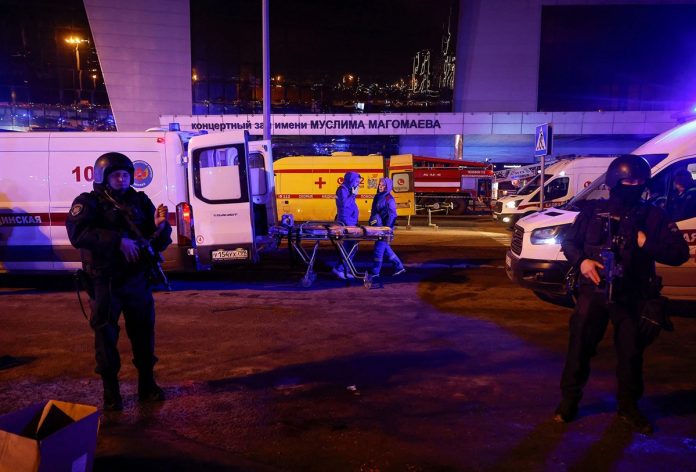France has halted talks with Russia over differing accounts on a phone call pertaining mainly to the Moscow terror attack. Paris is also denying having discussed the issue of Ukraine. What is going on?
After a rare telephone conversation last week between French Defense Minister Sebastien Lecornu and Sergei Shoigu, his Russian counterpart, which at first seemed like a diplomatic sign of good will for some dialogue, France’s foreign minister said on Monday that Paris was no longer interested in talking to Moscow. Last week, French President Emmanuel Macron said the Russian remarks during the aforementioned phone call had been “bizarre and threatening”. Supposedly Russia told France it hoped French Secret Services had not been involved in the Moscow region Crocus City Hall terrorist attack.
French minister Lecornu reportedly wanted to pass on “useful information” regarding the March 22 killings in the spirit of the “long tradition with Russia of cooperation on terrorism”. There are differing accounts on who exactly said what, but in any case France, as well as other Western powers, is currently waging a proxy war against Russia in Ukraine and moreover, these same powers have played a key role in the rise of the ISIS terror group, which is a Russian enemy in Syria and elsewhere, as I wrote. It is thus no wonder at all any Western offer of cooperation on that regard would be met with suspicion or even hostility by Moscow.
After the telephone call, in any case, Russia stated that “readiness for dialogue on Ukraine was noted” during the conversation – which France denies.
French-Russian tensions have been on the rise for a while. In February, President Macron suggested (and then half-denied) Western troops could be deployed in Ukraine. According to Le Monde on February 21 Macron told a handful of guests: “in any case, in the coming year, I’m going to have to send guys to Odessa.” On February 26, after hosting a meeting with several Western leaders, he stated “we will do everything needed so Russia cannot win the war”, adding that “we should not exclude that there might be a need for security that then justifies some elements of deployment.” The remark was promptly rebutted by other NATO leaders and by a White house statement.
One may recall that in June 2022, the French leader was being criticized by his allies for being supposedly “too soft on Russia.” In addition, since 2023, Macron had been a key proponent of the idea of “strategic autonomy” – which, in stark contrast with today’s stance on the New Cold War, sounded a lot like an European rendering of the Global South’s non-alignmentism. In April 2023, the French President said, in an interview, shortly after having met with Chinese President Xi Jinping, that Europeans should not be “America’s followers” and that the continent should rather become a “third superpower” between the US and China, by focusing on promoting defense industries.
Employing strong language, which sparked controversy, he even said that without “strategic autonomy”, Europeans would become “vassals” (of the Americans).
Macron’s increasingly hawkish rhetoric today, once again igniting controversy, may have a lot to do with attempts to show strength, while preparing for a Trump presidency scenario) in face of the geopolitical crisis currently faced by Paris in the African continent, exemplified by the Niger, Mali and Chad disasters. This is a region where, military presence aside, France competes with Moscow for influence and soft power projection. Anti-French feelings are in fact on the rise in Africa, while pro-Russian attitudes remain a legacy of the Soviet age: since the early decolonization period in the1950s, Moscow did support a large part of the African independence struggles.
Rhetoric aside, both Paris’ flirting with a non-aligned stance and its more recent suggestions about sending troops to Ukraine are seriously constrained by the same factor, namely US-led NATO. France, much like the rest of Western Europe, is too dependent on its American ally (who is also its industrial competitor in a subsidy war), and too deindustrialized to be able to come up with any real sovereign foreign policy. Moreover, even though its relationship with the Atlantic alliance has always been complex to say the least, France (again, much like the rest of the EU) is too entangled with NATO’s structures to pursue any substantial “strategic autonomy”.
On the other hand, the same NATO structures, namely Article 5 provisions (on attacks against one member being attacks against all) prevent France from deploying troops to Russia’s gates. Nobody wants a global thermonuclear war for now. For Washington, it has always been about an attrition proxy war against Russia, anyway. With the “Ukrainian fatigue” and global tensions having shifted to Palestine and the Red Sea, the US-led West bets, after the American elections, are apparently on a South Korea “land-for-peace” scenario for Ukraine. And Paris, in all likelihood, will follow that line, even if Macron chooses to keep adopting a controversial hawkish tone for reasons that are still not entirely clear. This kind of rhetoric in any case certainly does not do much good, diplomatically speaking.




